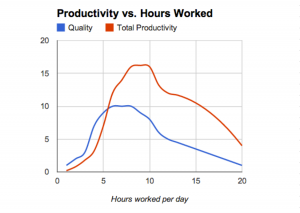
Are You Killing Yourself (And Your Productivity) With Long Hours?
Busy season is, well, busy! However, busy is not synonymous with productive. Too many people equate these two words. There’s a belief that working long hours is a badge of honor. Wrong.
Working long hours is actually counter-productive. It’s unhealthy and can be deadly.
As public accounting ramps up for busy season, it’s a good time to ask:
How Many Hours is Too Many?
Well, extensive research shows that working above and beyond 40 hours/week reduces productivity, quality of work and jeopardizes health.

The graph illustrates productivity peaks around 7 hours per day, begins to slip before the 10 hour mark and is in an all-out, downward spiral at 10+ hours.
Research specific to ‘Knowledge Workers’ also known as ‘White-Collar Workers’ places peak productivity even lower, between 5 – 6 hours per day. Why? Concentrated mental effort is draining. The brain becomes fatigued and loses focus. You’re in your chair…but not really there. So, you may think you’re working but, you’re not producing quality results and are more likely to make critical errors.
Killing productivity is one thing but, what about killing yourself? We all know working too much is bad for our health. Yet, there is that lingering belief that “it won’t happen to me.” The reality is…it can!
Overworking:
- Creates sleep deprivation.
- Causes obesity – thanks to those un-healthy meals eaten at your desk.
- Promotes heavy drinking. Working more than 48 hours/week is linked to risky alcohol consumption.
- Increases heart disease and strokes. Working between 41 and 48 hours is proven to create a 10% higher risk of stroke and working 49 to 54 hours creates a 27% increased risk.
How do you save yourself and your productivity?
- Tag Team. Cloud technology allows any authorized user to access a project anytime, anywhere. Where one person leaves off, another picks up. This gives the opportunity for each team member to take much needed downtime while the clients’ needs continue to be met seamlessly.
- Leverage your team. Insert your time only when and where necessary.
- Schedule Time Off. Set aside time just for yourself. Whether it’s a night out or an afternoon with the family, put time off on your calendar. Reduced hours = increased productivity. You and your clients will reap the benefits.
If you’re a firm partner:
- Add Project Staff. The money saved by reducing low productivity, higher error, high stress overtime hours and after-season-burnout employee turnover, will exceed the cost of the project staffers. (See: “The Benefits of Hiring Temporary Workers During Tax Season“, by Shala Marks)
Before going face-down into another busy season, make sure your focus is on impact rather than hours. Your body will thank you.
Need contract staff for busy season? Contact me. And connect with me on LinkedIn.
Visit SterlingFreeman’s website for more career nutrition for public accountants.
Go To SterlingFreeman - Career Wellness
